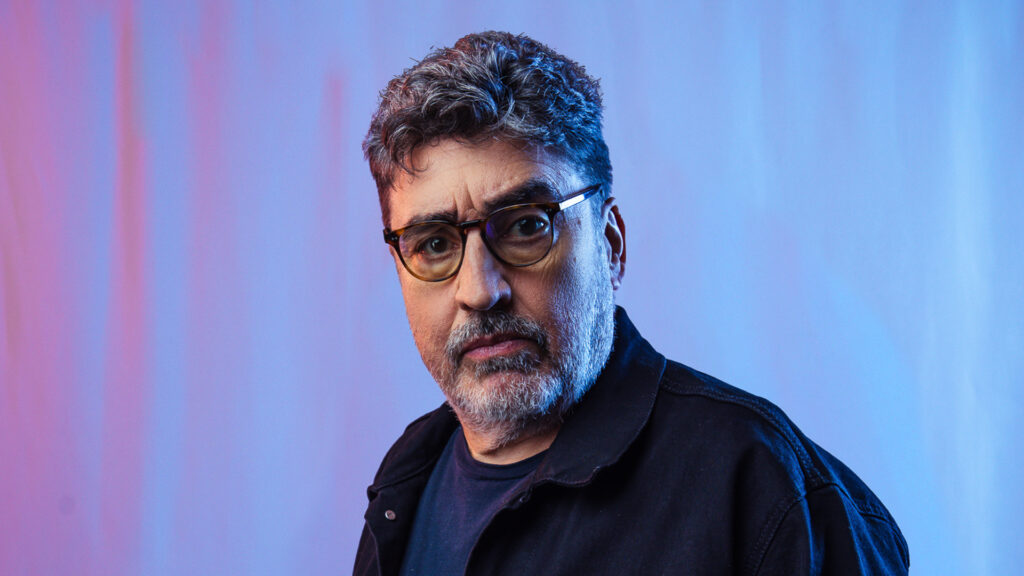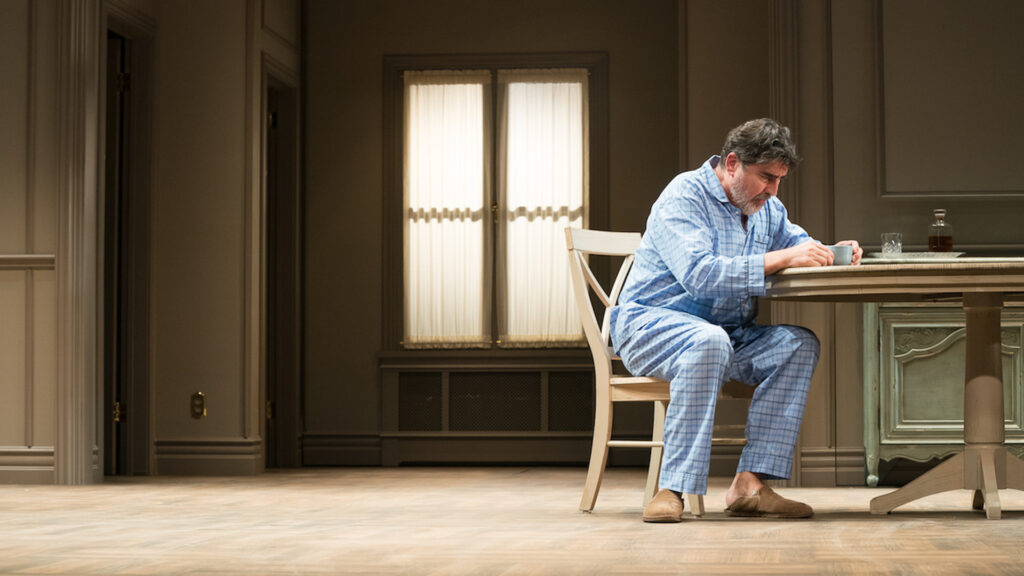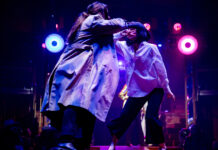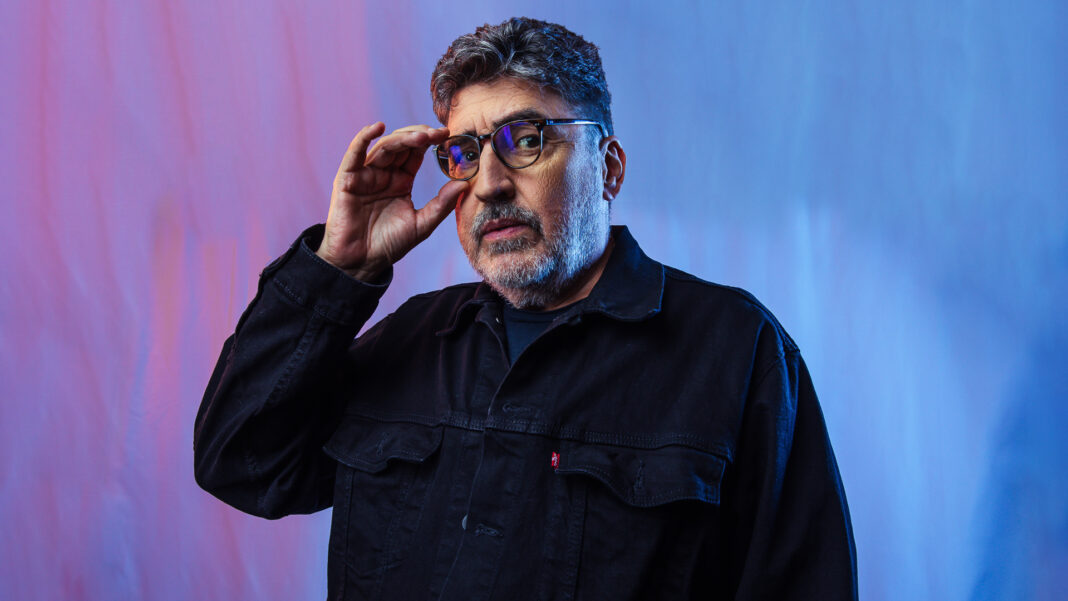Alfred Molina is never afraid to tackle big roles. He appeared on Broadway as artist Mark Rothko in John Logan’s Red. He was one of a trio of men arguing over the merits of a painting in Yasmina Reza’s Art. He’s played Tevye in Fiddler on the Roof. For all three performances he received Tony Award nominations.
In Los Angeles he’s appeared in Chekhov’s The Cherry Orchard as Lopakhin. He played James Tyrone in Eugene O’Neill’s Long Day’s Journey Into Night. He also memorably portrayed Andre in Florian Zeller’s The Father at the Pasadena Playhouse directed by Michael Michetti.
This weekend Molina can add the role of Henry Drummond in the 1955 play Inherit the Wind by Jerome Lawrence and Robert E. Lee to his resume. Sunday is the official opening night at the Pasadena Playhouse production where the show will run through November 26th.
Inherit The Wind is a fictionalized dramatization of the Scopes “Monkey” Trial from 1925 in which a teacher was put on trial for teaching Charles Darwin’s Theory of Evolution in a public school in violation of Tennessee state law. In the play, Henry Drummond is the defense attorney for teacher Bertram Cates (Abubakr Ali). The prosecutor, a devoutly religious man himself, is Matthew Harrison Brady (John Douglas Thompson). The goings on in the courtroom are reported by E.K. Hornbeck (Chris Perfetti) who is not above stirring things up.
The play remains surprising topical which is where I started my conversation with Molina earlier this week. What follows are excerpts from our conversation that have been edited for length and clarity. To see the full interview, please go to our YouTube channel. Also note that this interview does contain spoilers if you are unfamiliar with the play. Those questions have been annotated with an asterisk.

Q: I would like to start by asking about the resonance that this place still has 68 years after its debut. Re-reading the play, it seems more reflective of our world today than perhaps it was back in 1955.
I think you’re absolutely right. It’s one of the reasons that the play, I think, has been something that Danny Feldman, the Artistic Director at the Playhouse, has been wanting to do it. Precisely because of the timeliness of it. The play’s about the schism between the state and the church; between the teaching of evolution and creationism. All of these things which were hot button topics at the time, still are. Particularly book banning. I think that the resonance of the play is what is taking audiences by surprise.
Is there anything this production did to update it or make it more topical?
We’ve taken a broom and cleared away some of the dustier areas of it. We’ve done this obviously with the support and permission of the estates of Jerome Lawrence and Robert E. Lee. I think what we’ve discovered is a play that speaks very much to us now. Not just in obvious ways, but also in very subtle ways. There are lots of social and cultural points in the play that really show how far we’ve come. But also at the same time, how far we’ve still got to go.
*As with the Scopes trial on which it was based, in spite of a blistering defense by Clarence Darrow in the real courtroom drama, and by Drummond for Bertram Cates in the play, no matter how compelling, no matter how persuasive, people’s opinions were not going to be changed. There was nothing you could do. We’re so entrenched in our beliefs today that I just don’t think we’ve gotten very far at all.
The play also makes a case for if you can’t change someone’s mind, that doesn’t mean that they’re necessarily wrong or that you are wrong. That two points of view can coexist in a society and a culture that can still function. That’s what the play, I think, hits on now for a contemporary audience. I think that element in the play is almost as hard-hitting as any of the issues that it talks about in terms of the trial.
Clarence Darrow is quoted as having said, “Chase after the truth like all hell and you’ll free yourself, even though you never touch its coat tails.” Is he correct? And does that apply to an actor putting a character together, whether for film or stage?
It kind of does. It’s interesting how that quote of Darrow is slightly massaged in the sense that Drummond, in the play, talks about having no belief in reality at all, but belief in truth. And he says at one point, “Realizing that I may prejudice my own client, reality has no meaning to me whatsoever. But truth has meaning.” I think that for an actor is absolutely crucial, because the fact is that when we’re doing a play, what we’re doing isn’t real at all. It’s the absolute apex of artifice. But if it’s truthful, then it becomes much more authentic.
Is Drummond an honest man, or is he a persuasive man?
That’s an interesting question. I think he’s an honest man. The way he talks about himself in the play suggests that he understands his failings and understands that what he does is has limited effect. But it’s important that the work is done. Both men have a kind of nobility in their beliefs, in the purity of their beliefs, in the way that they stick absolutely to their beliefs. But neither of them are above sneaking in a few nasty ones. And I think that is what makes these characters so wonderfully human, very approachable and relatable, too.
*For me, the emotional turning point in terms of my response to Drummond, actually happens at the very end after his adversary has passed away and how respectful he is. Hornbeck says to him, “You hypocrite! You fraud! You’re more religious than he was.”
There’s a real truth to that because one of the things that the play surprisingly doesn’t quite land as well – it’s touched on very lightly – is the relationship that they had before this. That Drummond was actively supporting Brady in his presidential campaign. There’s a mutual respect. There’s an admiration. There’s also, I think, the vestiges of a friendship that maybe has gone a little sour because of events or because of positions that both men have taken. Which, of course, is incredibly prescient.
You think about the way that families have been split up through having differing political opinions and taking different positions on cultural issues or political issues and how those schisms seem completely unbridgeable because of it. The play is in many ways a plea for tolerance.
In an interview you gave to The Guardian in 2015 you said, “I don’t put myself through some terrible pain or create anguish for myself. That’s therapy.” Spencer Tracy, who played Drummond in the film, said the role of an actor is to, “know your lines and don’t bump into the furniture.” Do you share Tracy’s perspective or is it more nuanced than perhaps that quick statement would allow?
With all due respect to the memory of Mr. Tracy, I think his remark, to me, sounds like him not wanting to engage in a conversation with this particular journalist. It’s a great quote and I’ve heard it a million times from other actors. There is a certain efficiency to that approach, but there is a certain nuance to it.
I do feel that the storytelling in any form, whether it’s acting or playing music or dancing, should be a joyful, creative experience. It shouldn’t be one that is anchored in torture or self-doubt or misery. When you’re playing characters who are going through those kind of emotions or anguish of any kind, you have to be separate from it. Otherwise you can’t portray it effectively. If you’re in it in any way, it seems to me, you’re denying yourself and the audience a level of authenticity. If you’re so lost in the role, then it’s psychodrama. It’s not entertainment anymore. Yeah, it’s therapy.
You do not shy away from challenging roles. Drummond is a challenging role. I saw your performance in The Father at Pasadena Playhouse. How much do you want to continue tackling these rich, but complicated roles?

I would like to continue doing it as long as I’ve got two brain cells to rub together and I can still avoid bumping into the furniture. I’m fully aware that it’s not a level playing field. If you were talking to a female actor, they would have a very different perspective on this because that’s one of the one of the very unfair things about our industry. But speaking as a male actor, if there are parts that I can play, I’ll carry on doing it till I drop. If, touch wood and God forbid this doesn’t happen, but if something does happen where I find myself unable to fulfill the requirements, then I hope I’ll have the grace and the courage to call it a day. But until then, I’m happy to keep doing it.
When we last spoke nine years ago you mentioned that Pygmalion was a play on topping your list of things you’d like to do. Does that remain on your list?
It does. Very much so. I think it’s a wonderful play and it’s a very different thing from the musical version and the movie version.
I would love to see you play Archie Rice in The Entertainer.
That’s another play I’d love to have a go. Archie Rice, in particular, has a kind of tragedy to it that’s very much in the Arthur Miller world. There are these roles that have a kind of epic tragedy set in a very small, domestic, almost banal setting. Which, of course, makes the tragedy even more heartbreaking. It’s all very well to see a king or an emperor brought down. But when it’s someone who is living in much more domestic and ordinary circumstances, who happens to think he may be an emperor? That is even more heartbreaking somehow.
I read an interesting analysis of the Scopes trial in the Journal of Americans in Studies from May 2021. Tom Arnold-Forster argued that it wasn’t just the debate about scientific progress and religious reaction in that trial, but that it also framed a debate about the relationship between cultural conflict and media spectacle in the United States. Of course, media spectacle today is far greater than it ever would have been in 1955.
The debate at the heart of the play between science and religion is still very much there. There’s also the battle between these two men and their egos and the people they think or feel they represent. Brady, in the play, has a following and plays to that following. He plays to his base and this is something that we’re all very aware of now in modern politics. You throw enough red meat to the base and they will always follow you. Drummond also has a following, but they just don’t happen to be present in the trial. He’s very much isolated in the trial. He’s surrounded by the enemy, if you like. It’s a battle between two men who were once friends and who have a history together.
The way we’ve staged it sends a message about how media speculation and media coverage started to become a huge component in how it affects people’s minds. How it affects people’s opinions. You throw enough media attention on something and you actually can change minds. You can influence the way a person sees something. All these things make the play incredibly timely and very relevant now.
*Drummond tells Bertram Cates at the end of the play, “You don’t suppose this kind of thing is ever finished, do you? Tomorrow it’ll be something else.” What are your hopes that this line will someday be a relic of a time gone by and what do you think the role of the performing arts is in helping us get to that place?
I think the performing arts should, and deserve, to have a huge part in the social discourse of any culture, any society. The problem comes when that discourse or that that art form becomes completely dominated by money. I think there’s a problem when you can buy culture. When you can smother other points of view.
The social discourse being provoked by theatrical productions is somehow seen as less worthy or less valuable or less useful. But if we are truly aiming to be a democracy, then there will always be someone dissenting. That’s at the heart of democracy. There will always be someone saying, wait a minute, this isn’t working. Or, wait a minute, this isn’t right. And let me tell you why it isn’t right.
That right to be able to say this is being drowned out by money. When someone’s going to the theater and experiencing a play, you’re seeing characters or stories basically saying hear my voice. I think that’s a really important value that theater [and] the performing arts can offer.
I would hate it if we reached a point where, in the social discourse, everyone just kind of went, okay, that’s it. We’re done. We’ve covered everything. That would be awful because things constantly change. Democracies change the way we live. Our lives change. There’s always going to be someone or something that needs to be fixed. Something that needs to be improved on. Something that needs to be reworked or re-valued or just made better. That’s a constant process and I think that it’s important to be part of that conversation and to welcome it as well.
To see the full interview with Alfred Molina, please go here.
Main Photo: Alfred Molina (Photo by Jeff Lorch/Courtesy Pasadena Playhouse)











